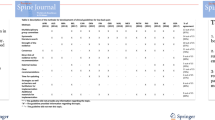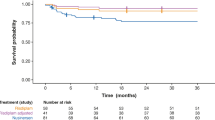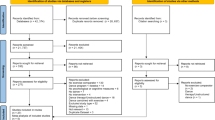Abstract
Objective
To compare the description of interventions defined as “usual care” in control groups with those provided in experimental groups in physiotherapy randomized clinical trials for multiple sclerosis.
Methods
Two independent reviewers conducted a literature search and study selection from five databases from their inception to February 2021. Randomized clinical trials aimed to physiotherapy multiple sclerosis treatment and providing “usual care” in the control group were included. Intervention reporting was assessed using the TIDieR checklist. Word and reference counts for each group were extracted. The methodological quality was assessed by the PEDro scale.
Results
Twenty-four articles were included. The TIDieR total scores, word, and reference count were statistically higher in the experimental group, when compared to the control group (p < 0.001). The TIDieR total score is not correlated with PEDro score, word, publication year, or reference counts.
Conclusion
Control treatments identified as “usual care” are underdescribed when compared to experimental treatments, affecting the validity, generalizability, and interpretability of results.

Similar content being viewed by others
Data availability
Not applicable.
Code availability
Not applicable.
References
Alla S, Pearson JF, Taylor BV, Miller DH, Clarke G, Richardson A, Willoughby E, Abernethy DA, Sabel CE, Mason DF (2016) Disability profile of multiple sclerosis in New Zealand. J Clin Neurosci 28:97–101
Ontaneda D, Thompson AJ, Fox RJ, Cohen JA (2017) Progressive multiple sclerosis: prospects for disease therapy, repair, and restoration of function. Lancet 389:1357–1366
Campbell E, Coulter EH, Mattison PG, Miller L, McFadyen A, Paul L (2016) Physiotherapy rehabilitation for people with progressive multiple sclerosis: a systematic review. Arch Phys Med Rehabil 97:141-151.e143
Amatya B, Khan F, Galea M (2019) Rehabilitation for people with multiple sclerosis: an overview of Cochrane Reviews. Cochrane Database Syst Rev 1:Cd012732
McGinley MP, Goldschmidt CH, Rae-Grant AD (2021) Diagnosis and treatment of multiple sclerosis: a review. JAMA 325:765–779
Dawson L, Zarin DA, Emanuel EJ, Friedman LM, Chaudhari B, Goodman SN (2009) Considering usual medical care in clinical trial design. PLoS Med 6:e1000111
World Medical Association (2001) World Medical Association Declaration of Helsinki. Ethical principles for medical research involving human subjects. Bull World Health Organ 79(4):373–374
Negrini S, Arienti C, Pollet J, Buraschi R, Gobbo M (2019) Opening the black box of ‘usual care’ and finding a black hole: a numerical systematic review on ‘usual care’ control groups in stroke rehabilitation RCTs. BMJ Evid Based Med 24:A27–28
Negrini S, Arienti C, Pollet J, Engkasan JP, Francisco GE, Frontera WR, Galeri S, Gworys K, Kujawa J, Mazlan M, Rathore FA, Schillebeeckx F, Kiekens C (2019) Clinical replicability of rehabilitation interventions in randomized controlled trials reported in main journals is inadequate. J Clin Epidemiol 114:108–117
Lohse KR, Pathania A, Wegman R, Boyd LA, Lang CE (2018) On the reporting of experimental and control therapies in stroke rehabilitation trials: a systematic review. Arch Phys Med Rehabil 99:1424–1432
Thompson BT, Schoenfeld D (2007) Usual care as the control group in clinical trials of nonpharmacologic interventions. Proc Am Thorac Soc 4:577–582
Freedland KE, Mohr DC, Davidson KW, Schwartz JE (2011) Usual and unusual care: existing practice control groups in randomized controlled trials of behavioral interventions. Psychosom Med 73:323–335
Levack WM, Martin RA, Graham FP, Hay-Smith EJ (2019) Compared to what? An analysis of the management of control groups in Cochrane reviews in neurorehabilitation. Eur J Phys Rehabil Med 55:353–363
Liberati A, Altman DG, Tetzlaff J, Mulrow C, Gøtzsche PC, Ioannidis JP, Clarke M, Devereaux PJ, Kleijnen J, Moher D (2009) The PRISMA statement for reporting systematic reviews and meta-analyses of studies that evaluate health care interventions: explanation and elaboration. Ann Intern Med 151:W65-94
Hoffmann TC, Glasziou PP, Boutron I, Milne R, Perera R, Moher D, Altman DG, Barbour V, Macdonald H, Johnston M, Lamb SE, Dixon-Woods M, McCulloch P, Wyatt JC, Chan AW, Michie S (2014) Better reporting of interventions: template for intervention description and replication (TIDieR) checklist and guide. BMJ 348:g1687
Yamato TP, Maher CG, Saragiotto BT, Catley MJ, Moseley AM (2018) Rasch analysis suggested that items from the template for intervention description and replication (TIDieR) checklist can be summed to create a score. J Clin Epidemiol 101:28–34
Elkins MR, Moseley AM, Sherrington C, Herbert RD, Maher CG (2013) Growth in the Physiotherapy Evidence Database (PEDro) and use of the PEDro scale. Br J Sports Med 47:188–189
Kelly LE, Davies EH, Saint-Raymond A, Tomasi P, Offringa M (2016) Important issues in the justification of a control treatment in paediatric drug trials. Arch Dis Child 101:962–967
Yu AM, Balasubramanaiam B, Offringa M, Kelly LE (2018) Reporting of interventions and “standard of care” control arms in pediatric clinical trials: a quantitative analysis. Pediatr Res 84:393–398
Berti A, Pini M, Ferrarello F (2020) Argentine tango in the care of Parkinson’s disease: a systematic review and analysis of the intervention. Complement Ther Med 52:102474
O’Neil J, McEwen D, Kang BK, Dorion M, Brosseau L, Imoto AM, Álvarez Gallardo IC, Westby MD (2021) Intervention reporting and dissemination of information for the management of hand osteoarthritis. J Hand Ther 34(3):362–368
Burgess LC, Wainwright TW, James KA, von Heideken J, Iversen MD (2021) The quality of intervention reporting in trials of therapeutic exercise for hip osteoarthritis: a secondary analysis of a systematic review. Trials 22:388
Pieri E, Bonetti F, Pellicciari L, Scipioni F (2021) Well-described exercises for chronic low back pain in Life Science Literature: a systematic review. J Back Musculoskelet Rehabil (in press)
McEwen D, O’Neil J, Miron-Celis M, Brosseau L (2019) Content reporting in post-stroke therapeutic circuit-class exercise programs in randomized control trials. Top Stroke Rehabil 26:281–287
Slade SC, Dionne CE, Underwood M, Buchbinder R, Beck B, Bennell K, Brosseau L, Costa L, Cramp F, Cup E, Feehan L, Ferreira M, Forbes S, Glasziou P, Habets B, Harris S, Hay-Smith J, Hillier S, Hinman R, Holland A, Hondras M, Kelly G, Kent P, Lauret GJ, Long A, Maher C, Morso L, Osteras N, Peterson T, Quinlivan R, Rees K, Regnaux JP, Rietberg M, Saunders D, Skoetz N, Sogaard K, Takken T, van Tulder M, Voet N, Ward L, White C (2016) Consensus on Exercise Reporting Template (CERT): modified Delphi study. Phys Ther 96:1514–1524
Hoogeboom TJ, Oosting E, Vriezekolk JE, Veenhof C, Siemonsma PC, de Bie RA, van den Ende CH, van Meeteren NL (2012) Therapeutic validity and effectiveness of preoperative exercise on functional recovery after joint replacement: a systematic review and meta-analysis. PLoS ONE 7:e38031
Kattackal TR, Cavallo S, Brosseau L, Sivakumar A, Del Bel MJ, Dorion M, Ueffing E, Toupin-April K (2020) Assessing the reporting quality of physical activity programs in randomized controlled trials for the management of juvenile idiopathic arthritis using three standardized assessment tools. Pediatr Rheumatol Online J 18:41
Author information
Authors and Affiliations
Contributions
M. P. and F. R. were primarily responsible for study conception and design and for data analysis and interpretation. All authors (M. P., F. R., L. P.) participated in the phases of the systematic review. M. P. analyzed the data. All authors (M. P., F. R., L. P.) interpreted the results. M. P. led the writing of the first draft of the manuscript. All authors (M. P., F. R., L..P.) contributed to drafting and revising the manuscript. M. P. is the guarantor. All authors (M. P., F. R., L. P.) read and approved the final manuscript.
Corresponding author
Ethics declarations
Ethics approval
Not applicable.
Consent to participate
Not applicable.
Consent for publication
Not applicable.
Conflict of interest
The authors declare no competing interests.
Additional information
Publisher's note
Springer Nature remains neutral with regard to jurisdictional claims in published maps and institutional affiliations.
Appendix 1 References of the articles included in the systematic review
Appendix 1 References of the articles included in the systematic review
-
1.
Rodrigues IF, Nielson MBP, Marinho AR. Avaliação da fisioterapia sobre o equilíbrio e a qualidade de vida em pacientes com esclerose múltipla. Revista Neurociências. 2008;16:269–74. https://doi.org/10.34024/rnc.2008.v16.8620
-
2.
Dodd KJ, Taylor NF, Shields N, Prasad D, McDonald E, Gillon A. Progressive resistance training did not improve walking but can improve muscle performance, quality of life and fatigue in adults with multiple sclerosis: a randomized controlled trial. Mult Scler. 2011;17:1362–74. https://doi.org/10.1177/1352458511409084.
-
3.
Schwartz I, Sajin A, Moreh E, Fisher I, Neeb M, Forest A, Vaknin-Dembinsky A, Karusis D, Meiner Z. Robot-assisted gait training in multiple sclerosis patients: a randomized trial. Mult Scler. 2012;18:881–90. https://doi.org/10.1177/1352458511431075.
-
4.
Gutiérrez RO, Galán Del Río F, Cano de la Cuerda R, Alguacil Diego IM, González RA, Page JC. A telerehabilitation program by virtual reality-video games improves balance and postural control in multiple sclerosis patients. NeuroRehabilitation. 2013;33:545–54. https://doi.org/10.3233/NRE-130995.
-
5.
Keser I, Kirdi N, Meric A, Kurne AT, Karabudak R. Comparing routine neurorehabilitation program with trunk exercises based on Bobath concept in multiple sclerosis: pilot study. J Rehabil Res Dev. 2013;50:133–40. https://doi.org/10.1682/jrrd.2011.12.0231.
-
6.
Ortiz-Gutiérrez R, Cano-de-la-Cuerda R, Galán-del-Río F, Alguacil-Diego IM, Palacios-Ceña D, Miangolarra-Page JC. A telerehabilitation program improves postural control in multiple sclerosis patients: a Spanish preliminary study. Int J Environ Res Public Health. 2013;10:5697–710. https://doi.org/10.3390/ijerph10115697.
-
7.
Straudi S, Benedetti MG, Venturini E, Manca M, Foti C, Basaglia N. Does robot-assisted gait training ameliorate gait abnormalities in multiple sclerosis? A pilot randomized-control trial. NeuroRehabilitation. 2013;33:555–63. https://doi.org/10.3233/NRE-130990.
-
8.
Skjerbæk AG, Næsby M, Lützen K, Møller AB, Jensen E, Lamers I, Stenager E, Dalgas U. Endurance training is feasible in severely disabled patients with progressive multiple sclerosis. Mult Scler. 2014;20:627–30. https://doi.org/10.1177/1352458513505351.
-
9.
Brichetto G, Piccardo E, Pedullà L, Battaglia MA, Tacchino A. Tailored balance exercises on people with multiple sclerosis: a pilot randomized, controlled study. Mult Scler. 2015;21:1055–63. https://doi.org/10.1177/1352458514557985.
-
10.
Feys P, Coninx K, Kerkhofs L, De Weyer T, Truyens V, Maris A, Lamers I. Robot-supported upper limb training in a virtual learning environment: a pilot randomized controlled trial in persons with MS. J Neuroeng Rehabil. 2015;12:60. https://doi.org/10.1186/s12984-015-0043-3.
-
11.
Gandolfi M, Munari D, Geroin C, Gajofatto A, Benedetti MD, Midiri A, Carla F, Picelli A, Waldner A, Smania N. Sensory integration balance training in patients with multiple sclerosis: a randomized, controlled trial. Mult Scler. 2015;21:1453–62. https://doi.org/10.1177/1352458514562438.
-
12.
Hansen D, Wens I, Keytsman C, Verboven K, Dendale P, Eijnde BO. Ventilatory function during exercise in multiple sclerosis and impact of training intervention: cross-sectional and randomized controlled trial. Eur J Phys Rehabil Med. 2015;51:557–68.
-
13.
Straudi S, Fanciullacci C, Martinuzzi C, Pavarelli C, Rossi B, Chisari C, Basaglia N. The effects of robot-assisted gait training in progressive multiple sclerosis: a randomized controlled trial. Mult Scler. 2016;22:373–84. https://doi.org/10.1177/1352458515620933.
-
14.
Fox EE, Hough AD, Creanor S, Gear M, Freeman JA. Effects of pilates-based core stability training in ambulant people with multiple sclerosis: multicenter, assessor-blinded, randomized controlled trial. Phys Ther. 2016;96:1170–8. https://doi.org/10.2522/ptj.20150166.
-
15.
Kalron A, Fonkatz I, Frid L, Baransi H, Achiron A. The effect of balance training on postural control in people with multiple sclerosis using the CAREN virtual reality system: a pilot randomized controlled trial. J Neuroeng Rehabil. 2016;13:13. https://doi.org/10.1186/s12984-016-0124-y.
-
16.
Hugos CL, Bourdette D, Chen Y, Chen Z, Cameron M. A group-delivered self-management program reduces spasticity in people with multiple sclerosis: a randomized, controlled pilot trial. Mult Scler J Exp Transl Clin. 2017;3:2055217317699993. https://doi.org/10.1177/2055217317699993.
-
17.
Kalron A, Rosenblum U, Frid L, Achiron A. Pilates exercise training vs. physical therapy for improving walking and balance in people with multiple sclerosis: a randomized controlled trial. Clin Rehabil. 2017;31:319–328. https://doi.org/10.1177/0269215516637202.
-
18.
Toomey E, Coote S. Augmenting home exercise programmes in multiple sclerosis with “exercise buddies”: a pilot study. International Journal of Therapy and Rehabilitation 2017;24;54–61.
-
19.
Arntzen EC, Straume BK, Odeh F, Feys P, Zanaboni P, Normann B. Group-based individualized comprehensive core stability intervention improves balance in persons with multiple sclerosis: a randomized controlled trial. Phys Ther. 2019 Aug 1;99(8):1027–1038. https://doi.org/10.1093/ptj/pzz017.
-
20.
Cuesta-Gómez A, Sánchez-Herrera-Baeza P, Oña-Simbaña ED, Martínez-Medina A, Ortiz-Comino C, Balaguer-Bernaldo-de-Quirós C, Jardón-Huete A, Cano-de-la-Cuerda R. Effects of virtual reality associated with serious games for upper limb rehabilitation inpatients with multiple sclerosis: randomized controlled trial. J Neuroeng Rehabil. 2020 Jul 13;17(1):90. https://doi.org/10.1186/s12984-020-00718-x.
-
21.
Ozdogar AT, Ertekin O, Kahraman T, Yigit P, Ozakbas S. Effect of video-based exergaming on arm and cognitive function in persons with multiple sclerosis: a randomized controlled trial. Mult Scler Relat Disord. 2020 May;40:101966. https://doi.org/10.1016/j.msard.2020.101966.
-
22.
Ryan JM, Fortune J, Stennett A, Kilbride C, Lavelle G, Hendrie W, DeSouza L, Abdul M, Brewin D, David L, Anokye N, Victor C, Norris M. Safety, feasibility, acceptability and effects of a behaviour-change intervention to change physical activity behaviour among people with multiple sclerosis: results from the iStep-MS randomised controlled trial. Mult Scler. 2020 Dec;26(14):1907–1918. https://doi.org/10.1177/1352458519886231.
-
23.
Straudi S, Manfredini F, Lamberti N, Martinuzzi C, Maietti E, Basaglia N. Robot-assisted gait training is not superior to intensive overground walking in multiple sclerosis with severe disability (the RAGTIME study): a randomized controlled trial. Mult Scler. 2020 May;26(6):716–724. https://doi.org/10.1177/1352458519833901.
-
24.
Ziliotto N, Lamberti N, Manfredini F, Straudi S, Baroni M, Tisato V, Carantoni M, Secchiero P, Basaglia N, Marchetti G, Bernardi F. Functional recovery in multiple sclerosis patients undergoing rehabilitation programs is associated with plasma levels of hemostasis inhibitors. Mult Scler Relat Disord. 2020 Sep;44:102319. https://doi.org/10.1016/j.msard.2020.102319.
Rights and permissions
About this article
Cite this article
Paci, M., Risaliti, F. & Pellicciari, L. Reporting of “usual care” as the control group in randomized clinical trials of physiotherapy interventions for multiple sclerosis is poor: a systematic review. Neurol Sci 43, 5207–5216 (2022). https://doi.org/10.1007/s10072-022-06167-9
Received:
Accepted:
Published:
Issue Date:
DOI: https://doi.org/10.1007/s10072-022-06167-9




